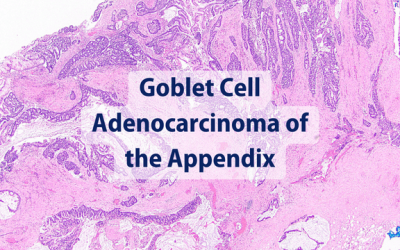
Goblet cell adenocarcinoma of the appendix is a subtype of appendiceal adenocarcinoma, which is itself a rare form of cancer. Goblet cell adenocarcinoma is characterized by the presence of tumour cells that secrete large amounts of mucin, a type of protein that gives mucus its slimy texture. This excess mucus production can cause the appendix to become enlarged and filled with mucus.
The exact cause of goblet cell adenocarcinoma of the appendix is not known, but it is believed to be related to genetic mutations that lead to the uncontrolled growth and division of the goblet cells in the appendix. Symptoms of goblet cell adenocarcinoma of the appendix may include abdominal pain, bloating, changes in bowel habits, and weight loss.
Diagnosis of goblet cell adenocarcinoma of the appendix typically involves a combination of imaging studies, such as CT or MRI scans, and a biopsy of the tumour tissue.
Because goblet cell adenocarcinoma of the appendix is a rare form of cancer, there is limited data on the prognosis and long-term outcomes of patients with this disease. However, early diagnosis and aggressive treatment may improve the chances of a favorable outcome.
More to read
You have to do research to find the right medical team that is experienced in treating PMP
I didn’t have any related symptoms before my diagnosis. I went to the urologist for some UTI treatment. The doctor (my hero) ordered a CT scan. That was the beginning of my journey. PMP is so rare and the right treatment is so important. You have to do research just to find the right medical team that is experienced in treating PMP. My wife and family, of course, were there for me.
How are goblet cell adenocarcinomas treated?
Once a doctor has determined that someone has Goblet Cell Adenocarcinoma, they will need to do tests to see how far the cancer has spread.
Is cancer of the appendix genetic?
A recent study in JAMA Oncology revealed that around 10% of individuals diagnosed with appendiceal cancer have an inherited genetic variant that increases their risk for cancer predisposition. This is the first study to identify inherited risk factors for this uncommon type of cancer.
References
Goblet cell adenocarcinoma of the appendix: Diagnosis, prognosis and nomenclature
Wang HL (2022). Goblet cell adenocarcinoma of the appendix: Diagnosis, prognosis and nomenclature. Journal of Clinical and Translational Pathology. Published September 28, 2022. Retrieved on April 15, 2023, from doi: 10.14218/JCTP.2022.00018
Goblet cell adenocarcinoma
Lollie T, Wang HL. Goblet cell adenocarcinoma. PathologyOutlines.com website. Retrieved on april 15, 2023, from https://www.pathologyoutlines.com/topic/appendixgobletcellcarcinoid.html.
Written by the Pseudomyxoma Survivor editorial team.
Updated: June 2, 2023



